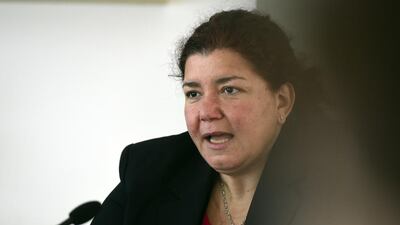AMMAN // Jordan’s Iftaa department, responsible for issuing religious edicts, has issued a fatwa for the first time that bans killing women in the name of honour.
Women activists hope that will curb a practice that claims the lives of about 20 women each year. But they said more had to be done to prevent perpetrators of so-called honour killings serving commuted sentences when families drop the charges.
The fatwa issued on Thursday declared “honour killings” to be contrary to Sharia and described it as one of society’s most heinous crimes.
“Anyone who kills his relative claiming that he wants to cleanse the [family] honour is committing an act against Sharia and should be held accountable,” the fatwa read.
“There should be no reduced sentences for a relative [who commits the crime] or if he based his actions on suspicions … because the judiciary is the only authority that is entitled to issue verdicts and enact them.”
The Iftaa department said the fatwa, which was posted on its website, was a response to a citizen’s question about Islam’s position on “honour killings”.
The ruling was welcomed by Rana Husseini, a journalist and independent human-rights activist who broke the silence on "honour killings"in Jordan through her reporting and in her book Murder in the Name of Honour.
“The fatwa is a step in the right direction that should have been taken a long time ago because it makes it clear that the so-called honour crimes are not affiliated with Islam,” said Husseini.
“We hope it will put an end to this cultural practice where 20 women on average are killed each year. But what’s more important is to repeal legislation to prevent perpetrators from benefiting from light sentences.”
Article 98 of the penal code allows killers to receive more lenient punishment if they committed the crime in a fit of fury. The penal code also allows a man’s penalty to be reduced “if he discovers his wife or a female relative committing adultery.”
Enaam Asha, an adviser at the Jordan chapter of the Sisterhood Is Global Institute, an NGO promoting rights, said: “The fatwa is important because it is issued by a religious authority and people identify with religious discourse. But it is not enough on its own and addressing the issue requires toughening the penalties against the perpetrators and increasing cultural awareness.”
Violence against women has increased, according to the NGO. This year, 28 women have been killed, up from 17 last year. Thirteen women were shot, eight were stabbed to death, one was hanged, two burnt to death, two were strangled and two beaten to death, although not all the killings were in the name of family honour.
The idea that a girl or a woman must suffer or even pay with her life if she is perceived to have sullied her family’s reputation is still powerful in Jordan, the result of a mindset where women are held to be the custodians of family honour.
Women are killed because they are suspected of involvement in illicit relationships or if they become pregnant out of wedlock, although in some cases “honour” can mask a financial motive.
Honour crimes gained renewed media attention in October when five occurred in the space of a week.
On October 8, an 18 year-old shot his 20-year-old sister dead as she slept because he found out that she owned a mobile phone that her family did not know about. He said he killed her to cleanse their family’s honour.
On October 13, two brothers, aged 22 and 24, shot their two sisters with a rifle. The older sister died instantly, the younger sister died two days later.
The brothers told the prosecutor that their older sister would often leave the house without her family’s permission, while the younger sister, 27, had given birth out of wedlock in June but later married the father of the child.
In the past 15 years, activists have been trying to make it harder for men to get away with killing their sisters and daughters in the name of “honour” by working to repeal laws that allow for lenient sentences. But parliament has resisted changes over fears that this would affect public morality and promote adultery.
But they have made some headway. In September 2009, a special tribunal was set up to hear cases of honour crimes. The sentences it has meted out have been more severe.
“It is not enough. We need to repeal articles in the penal code which are sometimes invoked in court to make the so-called honour crime be treated as a lesser crime,” said Husseini.
Another problem is when the victim’s family drop charges against the perpetrator, resulting in much-reduced sentences.
“The government needs to abolish this right,” said Husseini.
foreign.desk@thenational.ae

